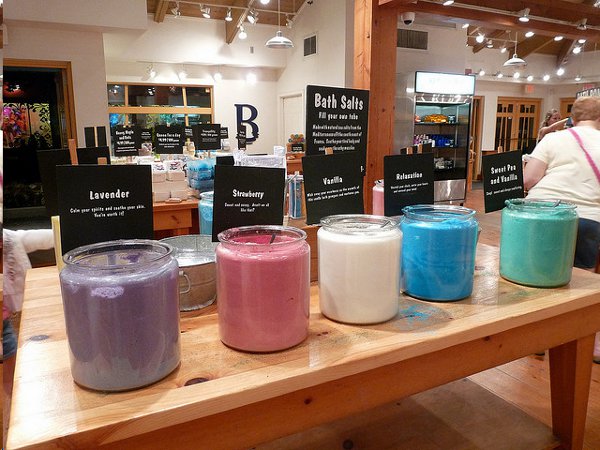Man Bites Dog: The Rise of America's 'Zombie Laws'

Just when you thought it was safe to resume chewing off people's faces, President Obama signed new legislation banning bath salts and other synthetic substances. The new federal law classifies many over-the-counter products as controlled substances with greater penalties. Other states have independently banned variations of the substances in response to publicized antisocial dietary behavior. New York recently became the 41st state to outlaw the use of bath salts. Often referred to as “designer drugs,” many bath salts sold as herbal remedies, such as Ivory Wave, Vanilla Sky, and Bliss, are currently being removed from store shelves.
States are responding to the current threat to public health and safety. However, many states missed the memo on crystal meth production, naively thinking the increase in trailer homes along the outskirts of town and the rise in cold medicine sales were signs of an expanding economy. Today, particularly in the Midwest, states are overly cautious to stem the emerging threat, and not get blindsided by a new generation of zombies.
In New York, lawmakers also seem concerned about the prophetic predictions of a “zombie apocalypse.” Governor Cuomo stated, "Bath salts and other synthetic drugs pose a direct, serious threat to public health and safety, and we must do everything we can to remove these harmful substances from sale and distribution in New York.” Still, other states have not taken action against the substances. States such as Washington, Oregon, New Hampshire, and Vermont, interestingly, have had no reported zombie incidents and have not moved forward with any bath salt restrictions.
To ease America’s fearful citizenry, The Centers for Disease Control and Protection issued a press release. The statement indicated that the “CDC does not know of a virus or condition that would reanimate dead.” Regardless of the outcome, the summer of 2012 became a dark season for hygienically inclined Americans who prefer soothing spa treatments at home.
To Use Or Not To Use
How does one maintain the line between a calming bath and chewing off another's face in a drug-induced rage? The answer is misuse. The New York State Poison Control Center fielded 321 calls in the first six months of this year compared to 291 in all of 2011. But overdoses from synthetic drug misuse are difficult to treat. Poison control centers and emergency room staffers are challenged to quickly diagnose and treat users before the onset of undead symptoms.
Some experts believe the new legislation is nothing more than a pipe dream. For instance, the misused ingredient in bath salts is commonly referred to as MDPV, but underground chemists are already repackaging new compounds that are yet to be banned. "Drug manufacturers are always one step ahead of the law," said Gail Banach of the Upstate New York Poison Center. "Certainly there’ll be new compounds, but if you build a higher wall, it makes it a little more difficult for the water to get over it.” When asked about a zombie's ability to climb walls, Ms. Banach had no comment.
Other experts suggest the lack of accurate detection makes enforcement meaningless. Blood, breath or urine analysis will not yield accurate field results for cops, and medical officials admit designer drugs will generally evade detection. According to Dr. Zane Horowitz, medical director of the Oregon Poison Center, “The only way we know if someone has taken them is if they tell you they have.” Fortunately, an overwhelming majority of law enforcement and medical professionals are skilled at quickly and accurately diagnosing zombie traits.

Still, some recreational users are skeptical of designer drugs. London resident Sarah Mitchell prefers the old reliable natural high to synthetic variations. “I’ve tried synthetic marijuana in England where they are still legal” says Mitchell, “I find them more dangerous than regular marijuana. When you come down off weed, you’re sweet. The come downs off designer drugs aren’t as easy.”
Practice Makes Perfect
Capitalizing on the real threat of a zombie apocalypse, a central New Jersey outfit has created a zombie training camp. Zombiesurvivalcourse.com offers one-day or full weekend seminars with hands-on training. Instructors teach live firearms handling, and crossbow training aimed specifically at stopping a zombie onslaught. Emergency first aid training includes addressing trauma wounds and sutures. The Zombie camp offers other life-affirming skills such as how to hotwire an automobile.
Mark Scelza, president and founder of the survival camp, recommends the training for everyone, and even sees virtue in the popularity of bath salts. "Bath salts are the best thing for my business this year," said Mr. Scelza, "They raise awareness for our course, and our curriculum helps in all areas of disaster preparedness. Our training is also helpful for hurricanes, tornadoes and earthquakes. It doesn't have to be just about zombies."
The Celebrated Cases
While no scientific link has been made between bath salts and zombie behavior, some celebrated cases have stirred the interests of the scientific community.
In June, a Texas man ate the family dog after smoking synthetic marijuana. According to reports from Waco, Texas, on June 14th, 22- year-old Michael Daniel was arrested after allegedly assaulting a few friends while running around and growling like a dog on all fours. Daniel then beat and choked the family dog and bit chunks out of the dog’s flesh. Sadly, the animal died shortly later.

Then in Utica, NY police were called to a bar to deal with an emotionally disturbed person. Upon confronting the woman in a staircase, she lunged at police while attempting to bite them. Police managed to subdue the woman, but she stated aloud that she wanted to murder and eat someone. At the hospital she was declared under the influence of bath salts.
Two weeks earlier, Louisiana resident Carl Jacquneaux was accused of gnawing the face off his neighbor, while under the influence, after some sort of domestic dispute. Afterward, Jacquneaux held another friend at knifepoint before police took him into custody.
Most popular is the Miami case this past May 26th, where Rudy Eugene was fatally wounded by police after being seen outdoors, naked, and literally consuming the face off another naked male in Miami. Interestingly, the Eugene case initiated most of the zombie apocalypse hysteria, but the medical examiner declared the criminal did not have bath salts in his system. Apparently Rudy Eugene had only marijuana and zombie tendencies coursing through him.
These incidents have catapulted bath salts to the forefront of dangerous and misused substances, while many lower their guard to other age-old intoxicants.
Easily found retail items such as model glue, mouthwash, aerosols, and broad-tip markers have regained prominence, as cough medicines and, now, bathing items are sequestered to padlocked storage areas by our nation’s finest apothecaries.
With bath salts being unregulated for years, and incidents of misuse 'low' before the rise in zombie activity, is there a possibility these herbal supplements are unjustly targeted? A quick Google search of the term may paint a different image. The top hits on a “bath salts” search produces lifestyle items akin to bathing and wellness products. Fragrances and soothing spa botanicals, such as lavender and vanilla, fill the pages with recommendations to other fine aromatherapy links. Sadly, there are no disclaimers warning of zombie-like predilections. The search makes one wonder if further FDA research was needed before labeling these products contraband. Interesting to note, many products are currently being marketed as “new blends.”
‘Symbolic’ Legislation
From an enforcement perspective, declaring most designer drugs illegal is symbolic at best. Designer drug detection is a challenging endeavor, and banning the substances does not make them less desirable. Judging from America’s failed attempts of restricting alcohol, cocaine, crystal meth, marijuana and most other illicit drugs in history, fierce penalties do little to deter the addicted or the undead. The toothless, undead-like appearance of a meth-head poses a serious risk to civilized society if left untreated. Most zombies, however, engage in little criminal behavior apart from mutilation and the occasional disembowelment.
Finally, bath salts cannot be detected by law enforcement field methods unless the user admits to their ingestion. No breath tests, nor urine, nor blood will give an officer probable cause for arrest without corroborating circumstances. After arrest, many prosecutors would be challenged to proceed without the severed appendages traditionally associated with zombie incidents.
Yet many states and now the federal government have instituted penalties for possession and misuse. Time will only tell if the nation’s zombie laws will have a true deterrent effect, or simply become another revenue-generating usage tax.
Author Bio:
Eugene Durante is a contributing writer at Highbrow Magazine.
Photos: Pat Arnow (Wikipedia Commons); Eric Parker, Leigh Caldwell (Flickr, Creative Commons).






























































































































































































































































































































